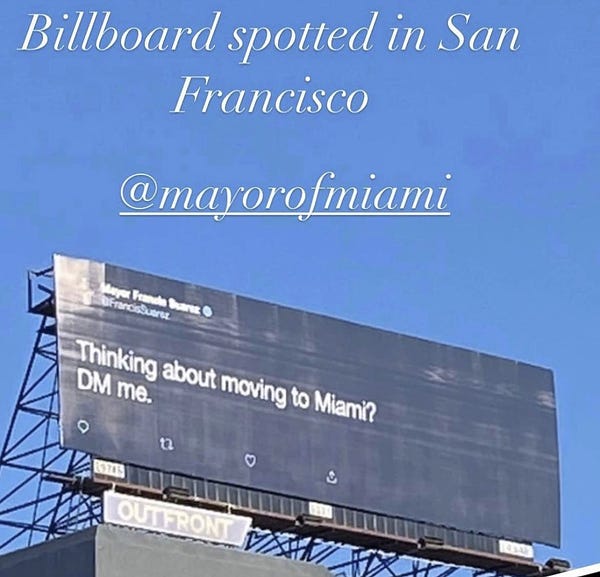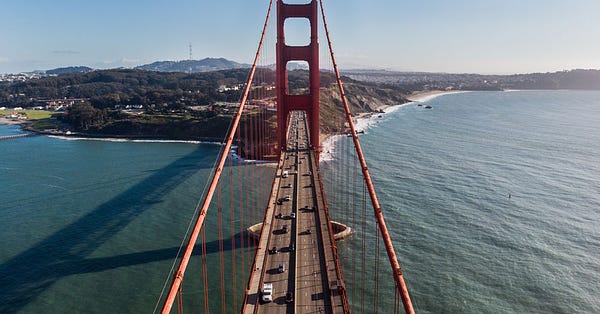Miami & Austin Are Wreaking Category Violence On Silicon Valley
Who will be the new category king "tech hub" region in the US?
Arrrrr! 🏴☠️Welcome to the free edition of Category Pirates. We publish radically different ideas with the goal of helping you create, design, and dominate your own category—in business and in life. If you enjoy this letter, we encourage you to check out some of our other favorites:
To hop aboard the pirate ship, subscribe below 👇
Dear Friend, Subscriber, and fellow Category Pirate,
Right now, we see category design happening in PLACES in the US.
Legendary places are legendary because they design and dominate a category.
Nashville: category queen city for songwriters.
Hollywood: category king city for entertainment.
New York: category queen city for finance & fashion.
London: category king city for international finance.
Bay Area: category queen city for technology & startups.
(We are using “queen” and “king” interchangeably.)
These are regions that became known for a niche they own—and did so intentionally. Nashville doesn’t market itself by saying, “Come to Nashville! Nashville, Nashville!” This would be the equivalent of marketing the brand first, which is a cardinal sin in category design we expounded upon in this letter.
Legendary places market the category of which they hold the leadership position.
When someone says “I’m going to visit the songwriting capital of the US,” they don’t need to say the city—you know they’re talking about Nashville. Or if they say, “I’m going out west to pursue my dream of becoming an actor,” you know they’re headed for LA. That’s because these cities have established themselves as queens and kings of specific categories—and successfully defended their positions from prying competitors.
But what happens when the category king of an industry, sector, or in this case, region of the United States, starts to neglect their precious category? More importantly, what happens when other cities witness this vulnerability and begin to attack?
We call this Category Violence.
Which is exactly what’s happening between Miami, Austin, and Silicon Valley right now.
Since the beginning of COVID, Miami Mayor Francis Suarez has been actively marketing for entrepreneurs and investors to leave SF, LA, and NY for Miami.


But when in the history of Silicon Valley has anyone in tech ever cared about Miami?
Silicon Valley is the legendary region that gave birth to Google, Facebook, Adobe, Netflix, Apple, Cisco, Oracle, Tesla and thousands of other groundbreaking companies. If you’re an entrepreneur, specifically a tech entrepreneur, why would you want to go anywhere else besides “The Valley”?
You didn’t—until the pandemic hit.
When COVID cases surged, and every company in the country was forced to shut down their offices and move their workforce remote, the rules of the game changed.
Forever.
All of a sudden, living in Silicon Valley was irrelevant—you were working out of your apartment or house just like everyone else. As a result, people started asking themselves, “If Silicon Valley isn’t really a region, but more of a network of people I can talk to over the phone or Internet from anywhere in the world, why am I paying a 30%+ premium to live here?”
And they started leaving in droves.


Now, not everyone who left SF in 2020 went searching for the next-best tech capital in the US.
On a practical level, the living cost of an apartment or house in SF compared to other cities like Denver, Austin, Seattle, or Miami is so disproportionate that unless you physically need to live in the Bay Area, it’s very hard to rationalize paying such an absurd premium. It’s estimated that rent prices in San Francisco are 89% higher than in Miami, with other living costs like restaurant prices and grocery prices also being higher, at 17.9% and 27.6% respectively.
But when you see California as a state hemorrhaging companies and wealthy individuals left and right, it stops being about “just the rent.” For example, Oracle, Palantir, and Hewlett-Packard, along with billionaires like Larry Ellison, Drew Houston, and Elon Musk all left California in 2020.
So, what does this exodus mean for cities like Denver? Seattle? Austin? Miami?
It means right now there is a game of Jump Ball for Category King status around where white collar tech-knowledge workers work.
Just like there was in the 80s.
People forget there was a time in history when Silicon Valley was not the category king region of technology.
In the 70s and 80s, that region was Boston—home to pioneers like Digital Equipment Corporation (DEC), headquartered in Maynard, Massachusetts, and Wang Laboratories based in Cambridge. At their respective peaks, Wang Laboratories had annual revenues of $3 billion and DEC had annual revenues of $14 billion, ranking it one of the most profitable companies in the country. In addition, DEC was responsible for creating and designing the category of “mini computing,” with its VAX line of superminicomputers and workstations being one of the most successful product lines in the history of technology. There was a point in time when the greatest job you could have in tech was selling VAXs.
And then the tech scene in Boston came to a screeching halt.
The 80s were a period of such rampant economic growth for the region that the decade became known as The Massachusetts Miracle—largely due to multibillion-dollar enterprises like Wang Laboratories and DEC creating jobs and paving the way for future innovation. Then, a little company named Hewlett-Packard from Palo Alto, California started expanding (for context, HP’s sales were only $5.5 million in the early 50s. By the 80s, sales had reached $6.5 billion and the company was employing 85,000 people). Then, another little company named Oracle, based out of Santa Clara, CA, started gaining traction. And then Cisco, in San Francisco. And then Apple. Google. Facebook. And so on.
There was a moment in the late 70s and early 80s where Boston was what Silicon Valley is today.
That is, until Boston’s category king position was wrestled away.
And not only did Silicon Valley emerge victorious, but it left this once-innovative region of Massachusetts borderline irrelevant.
Seminal companies, breakthrough products, partnerships with renowned institutions such as Stanford, and the creation of a venture ecosystem (the region’s data flywheel) led by people like Don Valentine, the founder of Sequoia Capital (and “grandfather” of the SV venture capital scene) and Eugene Kleiner, Tom Perkins, Frank Caufield, and Brook Byers, the four founders of the visionary early-stage fund, Kleiner Perkins, created an unstoppable, radically generous region for tech entrepreneurs.
The northern corner of California successfully redesigned the category of “tech hub.”
And as we have written about extensively in our other Category Pirate letters, the region captured (more than) two-thirds of the opportunities and economics as a result.
You either become legendary at category design, or fall victim to it.
Fast-forward to 2021, and here’s the irony:
The government of California and the leadership of Silicon Valley are acting the same way Blackberry and Xerox executives did right before they got wiped off the face of the planet, neglecting their categories and vacating their thrones. In 2009, BlackBerry was #1 on Fortune’s 100 fastest-growing companies list, boasting 37% market share in the U.S. smartphone market.
3 years later, BlackBerry’s market share was a little more than 7%.
Today, the company is a meme stonk.
Category violence is underway. And the techniques that made Silicon Valley companies “Silicon Valley companies” are now being used against Silicon Valley as a region by Miami, Austin, and other cities in the United States.
Silicon Valley today is risking being Boston in the late 80s.
The category “The Valley” used to own is now being threatened by cities like Miami and Austin who are actively and intentionally redesigning their regions to be new and radically different hubs for startup entrepreneurs.
Here are just a few of those radical differentiators:
Florida and Texas don't have a state income tax (whereas based on bracket, California’s state tax can get as high as 12.3%).
Both states are marketing “Young & Hungry” budding startup scenes (versus Silicon Valley’s legacy, incestuous, now-elitest startup scene).
Miami is attracting high-profile investors like Keith Rabois (Founders Fund general partner) and David Blumberg (Blumberg Capital founder). Austin has built a tech startup and venture ecosystem over years and is now home to Tesla and Oracle.
Miami has fully endorsed Bitcoin, becoming the first state to invest a portion of its treasury assets into the cryptocurrency.
Right now, Silicon Valley is doing nothing to remind the United States it is the epicenter of tech.
In fact, we could argue the technology that created Silicon Valley is now destroying it.
Meetings can happen over Zoom. Co-workers can chat over Slack. You don’t need to show up to a physical office to work at Twitter or Square. Why “live” in Silicon Valley?
Further, best we can tell, there is little indication by regional governments or the Newsom administration this exodus is even being acknowledged. California as a state, and the Bay Area as a region, is acting like a fat old queen resting on her laurels while her kingdom is being destroyed by up-and-coming pirates.
Regions ignorant of category design will fall victim to it.
Just because things are the way they are right now, doesn’t mean they will stay that way forever. Places like Miami and Austin have caught the Bay Area committing category neglect. And now, they are responding with category violence—with Texas’s recent massive energy failure representing yet another advantage for Miami.
Heed this warning: Silicon Valley and the San Francisco Bay Area need to evangelize and redesign the category and niche they once claimed as their own.
Otherwise, they will suffer the same fate Blackberry did to Apple.
A region is no different than a business.
Arrrrr,
Category Pirates






Had no idea about the Boston tech area history, great stuff.
I used to live in Northern California and would visit SF often. I witnessed the exodus from the area first hand as people were flocking to buy and rent cheaper homes up where I used to live (north of Sacramento).
Silicon Valley still has relevance, but it's a shadow of what it was a decade ago.
Fantastic analysis on the genesis of a regional category and its self destruction! Always Mind the Gap!